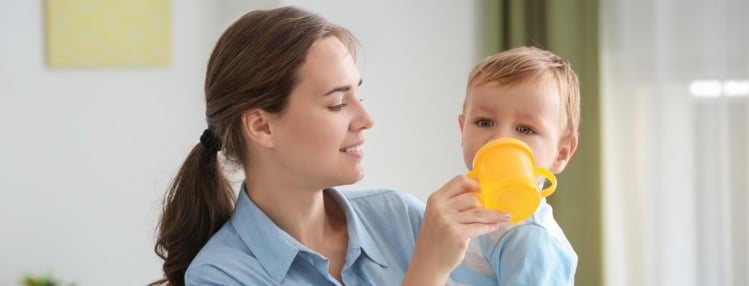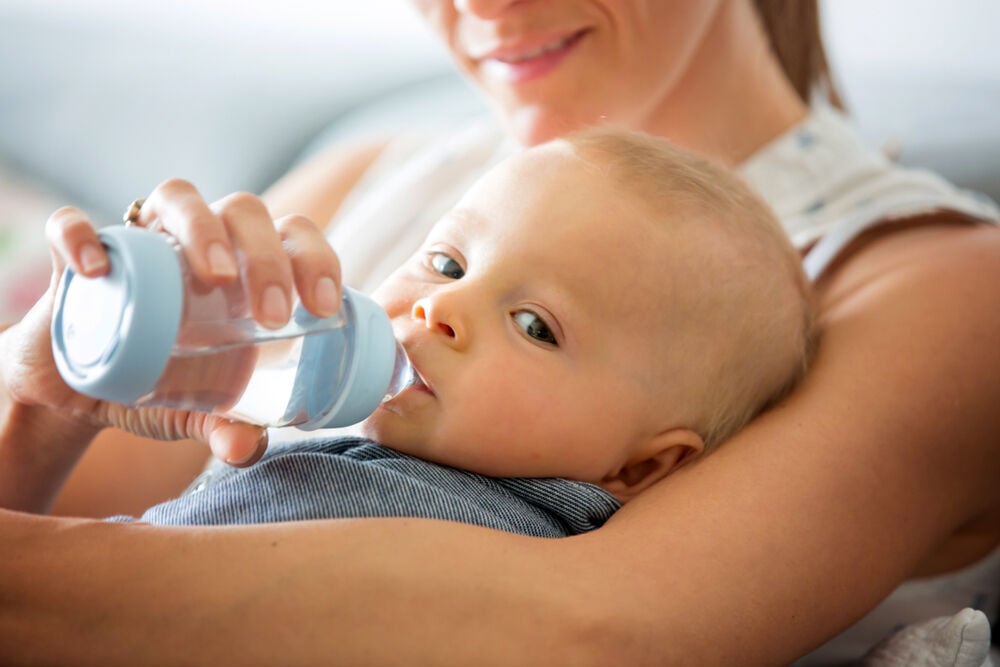-
Tracking cycle
-
Getting pregnant
-
Pregnancy
-
Help Center
-
Flo for Partners
-
Anonymous Mode
-
Flo app reviews
-
Flo Premium New
-
Secret Chats New
-
Symptom Checker New
-
Your cycle
-
Health 360°
-
Getting pregnant
-
Pregnancy
-
Being a mom
-
LGBTQ+
-
Quizzes
-
Ovulation calculator
-
hCG calculator
-
Pregnancy test calculator
-
Menstrual cycle calculator
-
Period calculator
-
Implantation calculator
-
Pregnancy weeks to months calculator
-
Pregnancy due date calculator
-
IVF and FET due date calculator
-
Due date calculator by ultrasound
-
Medical Affairs
-
Science & Research
-
Pass It On Project New
-
Privacy Portal
-
Press Center
-
Flo Accuracy
-
Careers
-
Contact Us
When Can Babies Have Water? The Unexpected Answer


Every piece of content at Flo Health adheres to the highest editorial standards for language, style, and medical accuracy. To learn what we do to deliver the best health and lifestyle insights to you, check out our content review principles.
Can babies drink water?
During the first six months, feeding practices might be hard to grasp, but don’t stress out about it. Soon, you’ll begin transitioning your child from breastfeeding or bottle-feeding to solid foods and drinks. How can you safely maintain their health and keep them hydrated?
It may seem a bit unnatural not to provide your newborn with water, especially if you live in a warm climate. However, research shows that water consumption prior to the age of 6 months is actually more harmful than beneficial. Water fills them up, while juice, which contains empty calories and added sugar, is known to cause diarrhea.
Early on, your breast milk is the only source of nourishment, as well as fluids, that your infant needs to satisfy their hunger and thirst. It contains the macronutrients, vitamins, and minerals required for proper growth and development. Until they’ve been weaned off of breast milk or formula (around the 6-month-mark), drinking water regularly could create potential health issues.
Note that there are exceptions to the rule. For example, if your child’s sick and losing fluids at a rapid rate due to diarrhea or vomiting, small amounts of water may be given. As always, though, consult your pediatrician first.
Why can’t babies drink water?
According to the World Health Organization (WHO), water consumption increases their chances for diarrhea, malnutrition, and even infection.
When consuming water, children tend to drink less breast milk or formula, resulting in a shortage of proteins, minerals, Immunoglobulin A (IgA), and antimicrobial peptides. They also demonstrate reduced appetite, as infants under 6 months receiving water show an 11% decrease in breast milk intake.
Pediatricians often exercise caution here to avoid the possibility of water intoxication. Your baby’s system is fragile and their kidneys don’t have the same capacity to filter water as yours. An overabundance of water pushes their kidneys to flush out sodium reserves, leading to an electrolyte imbalance. Symptoms of water intoxication include lethargy, vomiting, irritability, convulsions, and hypothermia. In serious cases, it may cause seizures, brain damage, or death.
Lastly, supplementing with water ups your baby’s likelihood of contracting infections. Improperly purified water can contain dangerous pathogens and waterborne diseases that their bodies cannot fight off.
Flo is a fantastic app that keeps me on top of everything about my body. The period tracker is amazing.
When do babies start drinking water?
Take a quiz
Find out what you can do with our Health Assistant

The American Academy of Pediatrics recommends exclusively breastfeeding for the first six months of life. It’s wise to wait until after you’ve weaned your baby and introduced some soft solids before offering water.
At 3 months, your infant’s kidneys are approximately two-thirds developed. At six months, their kidneys are better equipped to regulate water intake.
Between the ages of 6 and 12 months, it’s safe to provide small amounts of water to supplement breast milk/formula and solid foods. Even then, use just enough to get your child accustomed to drinking water. A few sips here and there, totaling 2 to 4 ounces per day, should do the trick.
Can babies get dehydrated?
Many parents believe that if they’re not giving their baby any water, they may become dehydrated. But that’s definitely not the case. Since breast milk is composed of more than 80 percent water, it’s ideal for keeping your infant hydrated and nourished for the first six months.
Can you dilute formula with water?
Formula should never be mixed with more water than what’s outlined in the instructions. This practice reduces the amount of nutrients absorbed at each feeding, and leaves your baby susceptible to electrolyte imbalances and water intoxication.
Overconsumption of water triggers their cells to absorb more than they can handle. It produces swelling throughout the body, including in the brain. That’s why it’s extremely important to follow the package directions for mixing formula.


Hey, I'm Anique
I started using Flo app to track my period and ovulation because we wanted to have a baby.


The Flo app helped me learn about my body and spot ovulation signs during our conception journey.


I vividly
remember the day
that we switched
Flo into
Pregnancy Mode — it was
such a special
moment.
Real stories, real results
Learn how the Flo app became an amazing cheerleader for us on our conception journey.




